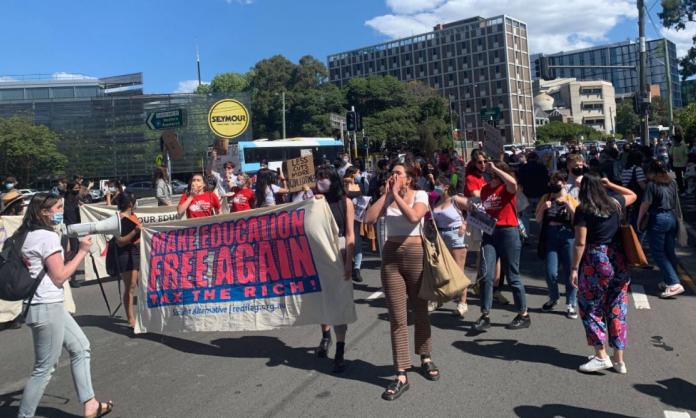23 September 2020 will go down in the University of Sydney’s activist history books as the day students and staff successfully defied the New South Wales government’s anti-protest laws and resisted the Liberal Party’s attacks on universities.
Tertiary students and staff are facing major restructures pushed by the federal government and university administrations. Domestic fees for arts and communications degrees will double under the plan. Commerce, law, economics and other courses deemed of little immediate value to the economy will also be subject to significant fee hikes. Students who fail more than half their courses in their first year will be denied access to HECS loans, and government funding of higher education will decrease.
Meanwhile, university bosses are using the cover of the COVID-19 crisis to carry out mass sackings and force remaining staff to shoulder greater workloads. Sydney University has cut $93 million from its casual staffing budget since the crisis hit and has directed heads of faculty to aim for a 30 percent reduction in full-time staffing levels. The University of New South Wales has likewise announced 500 full-time job cuts.
Police have shut down four previous student demonstrations against these cuts, using the special COVID-19 measures as a pretext. Dozens of students have been fined, despite rally organisers implementing strict safety measures. Various tactics have been employed by students, including organising a “Footy against Fee Hikes” event, during which fewer than twenty students (the maximum number allowed under the current restrictions) gathered in a park to kick a ball around while chanting.
Astoundingly, this action was shut down by the police under the pretext of COVID-19 safety. Yet the nearby Broadway shopping centre remains open and in-person lectures at the university—where face masks are not mandatory—continue. It’s now obvious to many students that the repression of protests has nothing to do with safety.
For the last month, campus activist collectives have been debating how to organise against the cuts in the face of this assault. Following an action on 16 September, when small, masked, socially-distanced and dispersed groups of student protesters were broken up by the police, Socialist Alternative student members decided it was time to take a stand, arguing for another rally the following week involving a central rally in defiance of the repression.
This proposal was widely supported on the student left. Activists from several other campuses organised contingents, and University of New South Wales students held their own successful action at the same time. Only Solidarity, a small socialist group based at Sydney University, objected, arguing that the proposal was ultra-left, unsustainable and unachievable. Solidarity members argued that another protest would alienate students and staff afraid of being arrested and would therefore be a barrier to building a mass movement.
This assessment couldn’t have been more wrong. The rally was a triumph, widely seen as the most radical and successful protest the student left has organised all year, and an important victory against police repression.
Around 350 students attended the action, which featured an outdoor teach-in organised by National Tertiary Education Union activists. The teach-in was titled “Higher education and democratic society: perspectives on dissent” and featured speakers on resistance in the Arab world and the history of student protest, along with other left-wing topics. It had university approval to go ahead and became a central meeting point for the various student contingents.
From there, hundreds of students almost spontaneously charged from the campus onto the busy surrounding arterials, scrambling to get ahead of the police and stop traffic. Sitting down at a busy intersection, we held our ground. Once the police appeared, we again ran from the cops, this time back to the campus, police horses galloping behind. Several protesters jumped a tall metal fence to get away, others just ran to avoid being grabbed by swarming police.
In the end, 21 fines were issued to protesters, much like previous actions. But students left the demonstration confident our point had been made and emboldened to continue the fight. The protest attracted more news coverage than all of the previous actions combined and has led to a welcome public discussion of the hypocrisy of the state government’s unofficial ban on protests.
This is just the beginning. In the next few weeks, it’s likely that the Morrison government will ram its attacks on higher education through the Senate. Sydney University’s multi-millionaire vice-chancellor Michael Spence wants hundreds more staff axed as soon as possible. Students and staff will have to continue standing together to stop this. To have any chance of success, this means challenging police repression too.
Lily Campbell is a member of the Education Action Collective at the University of Sydney








